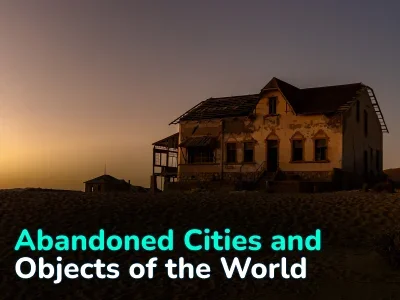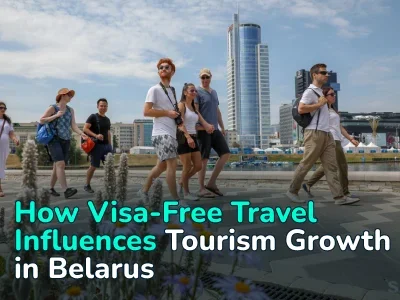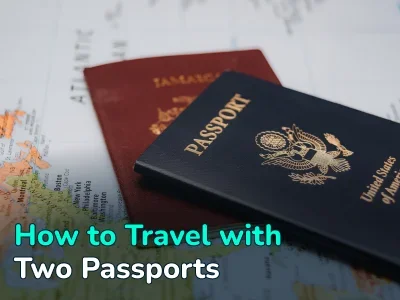
Digital Nomad Visa in Asian Countries
If you work remotely and love to travel around Asia, it's now more possible than ever to combine business with pleasure. The key to this balance is applying for a digital nomad visa. We will tell you in detail about each of the Asian countries where it is possible to obtain nomad status in this guide.
By the way, similar documents are already issued for remote workers and freelancers on almost all continents — read our large article, where we have collected all the countries in the world that currently issue a digital nomad visa.
Now let's focus on Asia.
Kazakhstan
On November 1, 2024, Kazakhstan introduced the Neo Nomad visa.
Peculiarities:
- It is possible to come to the country together with family members.
- Possibility to work remotely from Kazakhstan.
- The visa does not imply employment in the local labor market.
- Validity period: up to one year. There is a possibility of one-time extension. The maximum period of stay is 12 months.
Requirements:
- Annual income of at least 3000 US dollars.
- Proof of work as a freelancer or remote employee.
- Passport validity of more than 12 months at the time of application.
- Availability of health insurance.
- A certificate of no criminal record.
You can apply: online through the official e-government portal; in consular offices of Kazakhstan abroad; through authorized migration centers.
Kyrgyzstan
UPD: 30.04.2024 Kyrgyzstan ended this program.
Kyrgyzstan recently introduced its own visa for nomads.
Peculiarities:
- Exemption from the need to obtain a multiple-entry visa, work permit, and registration at the place of stay.
- Automatic receipt of a personal identification number.
- You can operate as an individual entrepreneur or as a legal entity.
- You can move with your family.
- It is impossible to obtain a residence permit.
Validity: 1 year, extendable for 2 years.
Requirements:
- You must be a citizen of one of these countries: Azerbaijan, Armenia, Belarus, Kazakhstan, Moldova, or the Russian Federation.
- Areas of activity for which you can apply (IT, programming, design, media art, etc.).
- There are no income requirements, but you will need to provide an extract.
You can apply for the visa here.
The application review period is 3 working days.
Visa cost: free.
Life in the country: rent of a one-room apartment: €300–400, utilities: €27, monthly pass: €7, lunch in an inexpensive café: €5.
Malaysia
Malaysia has launched a new visa program, DE Rantau Nomad Pass, designed specifically for digital nomads.
Peculiarities: You can come to the country with family members — spouse/partner, children under 18 years of age, and disabled children without any age limit.
Validity: from 3 to 12 months, with the possibility of extension for another 12 months; thus, the maximum period of stay is 24 months.
Requirements:
- Annual income of at least $24,000.
- Confirmation of work as a freelancer (contracts, invoices) or remote employee (employment contract).
- The passport is valid for more than 14 months at the time of application.
- Also required is either a sponsor (an organization in Malaysia) or a deposit with MDEC as a security deposit.
You can apply online.
Visa cost: for the main applicant, 1080 ringgit (about 250 US dollars); for each additional applicant, 540 ringgits. Plus an immigration fee of RM90 every 3 months, or RM360 per year.
Processing time: Initial review of the application takes 6–8 weeks, and issuance of a visa sticker after approval takes 1 week; visa extensions are processed within 4 weeks.
The cost of living in the country: rent of a one-room apartment: €220-300, utilities: €40, monthly pass: €10, lunch in an inexpensive café: €2.50.
UAE
The UAE issues a visa for self-employed persons (the so-called “Green Visa”).
Validity: provided for 60 days to complete the process of obtaining a five-year residence permit.
Requirements:
- Request a self-employment permit from the Ministry of Human Resources and Emiratisation.
- Have a higher education (minimum bachelor's degree).
- Evidence of financial stability, namely at least 360,000 dirhams (about $98,000) in annual income for the last 2 years.
The application can be submitted online or at the Amer migration service within the country.
Visa cost and other fees: The visa fee is 200 dirhams (about $55) plus VAT 5%. When staying in the UAE, an additional fee for being in the country (500 dirhams) and several minor fees are paid.
Life in the country: rent of a one-room apartment: €1100–1600, utilities: €160, monthly pass: €73, lunch in an inexpensive café: €8.
They also issue a talent visa in Dubai, which we have already written about in detail.
Taiwan
The Employment Gold Card visa is valid in Taiwan.
Peculiarities:
- It combines a residence permit, a work permit, an identity card for foreigners, and the right to multiple entry/exit.
- With it, you can look for a job, work part-time, and change employers.
- Provides tax benefits and an accelerated path to permanent residence.
- Entitles you to health insurance without a six-month waiting period.
Validity: from 1 year to 3 years, with the possibility of extension.
Requirements:
- Meet the criteria of a highly qualified specialist in your field (science, technology, economics, culture, sports, education, architecture, digital technology, and so on).
- Confirm professional qualifications, experience, and achievements in the chosen field of activity.
- There is no requirement to have an employer/sponsor in Taiwan in advance.
Applications can be submitted online on the program website.
Processing time: 30 days, in some cases up to 50–60 days.
Visa cost: from $100 to $310 — everything will depend on citizenship and visa period.
Life in the country: rent of a one-room apartment: €300–400, utilities: €75, monthly pass: €35, lunch in an inexpensive café: €4.5.
Thailand
Thailand offers an LTR (Long-Term Resident) visa, which is suitable for highly qualified specialists and wealthy individuals.
Peculiarities:
- It allows you to move to Thailand with your family (spouse and children).
- Provides various tax breaks and other privileges.
- It is not a residence permit but gives the right to multiple visa-free entry/exit.
Validity: initially issued for 5 years, with the possibility of renewal for a further 5 years if requirements are met.
Requirements:
Vary depending on the visa category. For the “Work-from-Thailand Professionals” category, which is suitable for nomads, the requirements are as follows:
- Minimum personal income for the last 2 years has been at least $80,000 per year (about 2.8 million baht).
- Having a health insurance policy that covers a minimum of $50,000 in expenses OR receiving social security benefits in Thailand, OR maintaining a bank account with a balance of at least $100,000 in the last 12 months.
- Remote work with a foreign employer/clients in Thailand. For this category, it is not possible to obtain a work permit in Thailand because work is carried out remotely for a foreign company.
Submitting an application is possible online through the LTR system with the provision of the necessary documents. Then you will have to undergo approval by the relevant government agencies (about 20 working days). After approval, a visa is issued at the Thai embassy/consulate abroad or at the One Stop Shop in Bangkok.
The fee for a 10-year visa is 50,000 baht (about $1500).
Life in the country: rent of a one-room apartment: €200–430, utilities: €62, monthly pass: €30, lunch in an inexpensive café: €2.5.
Turkey
Turkey has also recently started issuing a visa for digital nomads (Turquoise Card).
Peculiarities:
- Allows you to live and work remotely in Turkey.
- Access to health care and education system.
- Visa-free travel to many countries.
- Ability to bring family members (considered individually).
- Cannot work for local Turkish companies.
- Visa validity period: 1 year.
Requirements:
- Age between 21 and 55 years old.
- Citizenship of one of 35 countries (EU countries, UK, USA, Canada, RF, Ukraine, Belarus, etc.).
- Higher education (university diploma).
- Valid passport (minimum 6 months of validity).
- Proof of income of at least $3000 per month or $36,000 per year.
- Health insurance.
- Proof of employment as a nomad: contract with an employing company (not from Turkey); for the self-employed, contracts with client companies (not from Turkey).
- Biometric photo.
There are two steps to apply for a visa:
- Obtain a Digital Nomad Identification Certificate through an online platform.
- With the certificate, go to a visa center/Turkish consulate to apply for a visa.
Life in the country: rent for a “one-bedroom” — €400-600, utilities — €60, monthly pass — €34, lunch in an inexpensive café — €8.50.
Popular cities for Digital Nomads in Turkey are Istanbul, Ankara, Izmir, Antalya and Bursa.
For questions about obtaining a Digital Nomad Identification Certificate, please contact: nomad@ktb.gov.tr.
Author
I am responsible for editorial work. I write expert interviews and guides.























